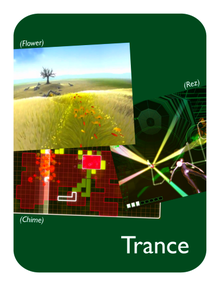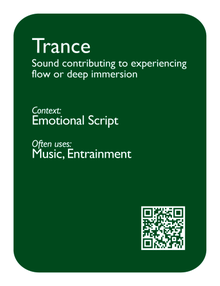Difference between revisions of "Trance"
From SoundInGames.com - Sound Design in Games
ValterAlves (Talk | contribs) m |
ValterAlves (Talk | contribs) m |
||
| Line 6: | Line 6: | ||
| patternpresentation = | | patternpresentation = | ||
| cardpresentation= | | cardpresentation= | ||
| − | | | + | | v10frontface =Trance-front-v10.png |
| − | | | + | | v10backface =Trance-back-v10.png |
| + | | v20frontface =Trance-front-v20.png | ||
| + | | v20backface =Trance-back-v20.png | ||
| screenshots= | | screenshots= | ||
| v10rel-tag1=Context:<br> | | v10rel-tag1=Context:<br> | ||
Revision as of 15:05, 21 November 2011

|

| |
| The card's front face | The card's back face |
Synopsis
| Sound contributing to experiencing flow or deep immersion. |
Relationships
Context:
Emotional Script ![]() .
.
Often uses:
Music ![]() , Entrainment
, Entrainment ![]() .
.
Description
The ability to allow the player to experiment Trance can be highly potentiated by the use of sound. Still, it is important to recognize that Trance is highly dependent on the gameplay, to start with.
Trance refers to the ability to enter a state of flow or deep immersion lead by the presented stimuli, with consequent impact on the Emotional Script.
The use of sound to induce Trance, namely in Music through Entrainment, is practised for millennia (e.g. in Shamanism) and is well document [pending: Refs].
Examples
  |
External Resources
[pending: Add links to documentation in this matter]

